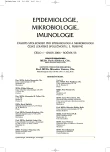-
Medical journals
- Career
Current Prevalence of Toxocariasis and other Intestinal Parasitoses among Dogs in Bratislava
Authors: A. Totková; M. Klobušický; R. Holková; L. Friedová
Authors‘ workplace: Parazitologický ústav LF UK Bratislava
Published in: Epidemiol. Mikrobiol. Imunol. 55, 2006, č. 1, s. 17-22
Overview
Contamination of public open spaces with dog feces was monitored in five Bratislava districts. Only two of 459 fecal samples collected originated from cats and tested positive for Toxocara cati while the remaining samples were dog feces. Intestinal parasites were detected in 215 (46.8 %) samples, with Toxocara canis and Toxocara cati being recovered from 86 (18.7 %) and 2 (0.4 %) samples, respectively. Taenia sp., Dipilidium caninum, Ancylostoma sp., Capillaria sp., Trichuris vulpis and Strongyloides sp. were also among intestinal worms detected. Of these, parasitic helminths of the genera Ancylostoma, Taenia and Strongyloides appeared to be of epizootic importance. Giardia was the significantly most frequent genus among intestinal protozoans while Isospora, Sarcocystis and Cryptosporidium were considerably less common.
Toxocara canis showed similar distribution in all districts monitored. The prevalence rates ranged from 18.6 % to 20.7 % in districts I to IV. The lowest prevalence rate of 16.1 % was found in district V situated on the other bank of the Danube, which can be explained by a particular epizootic process in the city district separated by the river.
The detection rates of parasites from dog feces suggested a seasonal trend, ranging from 40.5 % in winter to 50 % in autumn. Toxocara canis also showed 10 % higher prevalence rates in autumn (23.5 %) compared to winter (13.5 %). Significantly higher rates of parasites were recovered from fresh dog feces.Key words:
toxocariasis – larva migrans – Toxocara canis in Bratislava dogs – distribution by district – distribution by season – preventive and administrative measures.
Labels
Hygiene and epidemiology Medical virology Clinical microbiology
Article was published inEpidemiology, Microbiology, Immunology

2006 Issue 1-
All articles in this issue
- Current Epidemiological and Clinical Issues Regarding Helicobacter pylori Infection in Childhood
- Current Prevalence of Toxocariasis and other Intestinal Parasitoses among Dogs in Bratislava
- Methods for Detection of Biofilm Formation in Routine Microbiological Practice
- Vibrio Cholerae 01 in a Fish Aquarium
- Diagnosis of Rotavirus Infections in 2004, Major Characteristics in 1998–2004 in the Czech Republic
- Comparison of Efficacy of the Rapid Mycobacteria Growth Indicator Tube (MGIT) Culture Method (Manual System) and Conventional Culture Method in Mycobacterial Detection
- Epidemiology, Microbiology, Immunology
- Journal archive
- Current issue
- Online only
- About the journal
Most read in this issue- Methods for Detection of Biofilm Formation in Routine Microbiological Practice
- Comparison of Efficacy of the Rapid Mycobacteria Growth Indicator Tube (MGIT) Culture Method (Manual System) and Conventional Culture Method in Mycobacterial Detection
- Current Prevalence of Toxocariasis and other Intestinal Parasitoses among Dogs in Bratislava
- Current Epidemiological and Clinical Issues Regarding Helicobacter pylori Infection in Childhood
Login#ADS_BOTTOM_SCRIPTS#Forgotten passwordEnter the email address that you registered with. We will send you instructions on how to set a new password.
- Career

